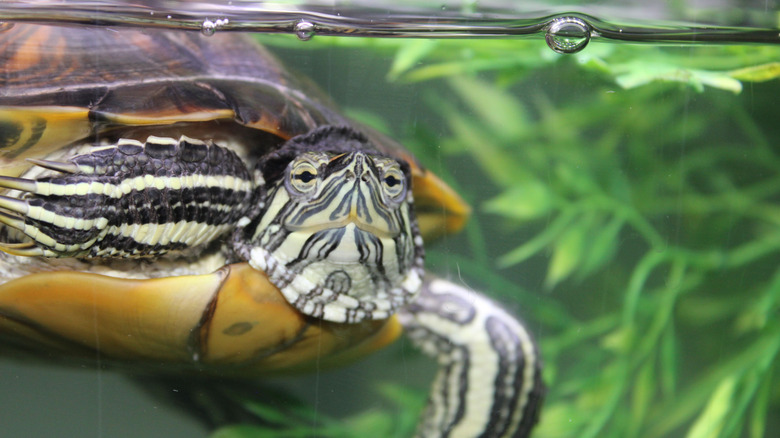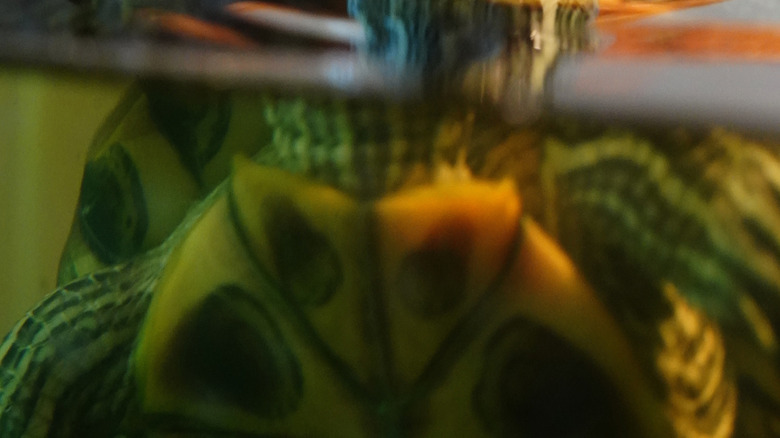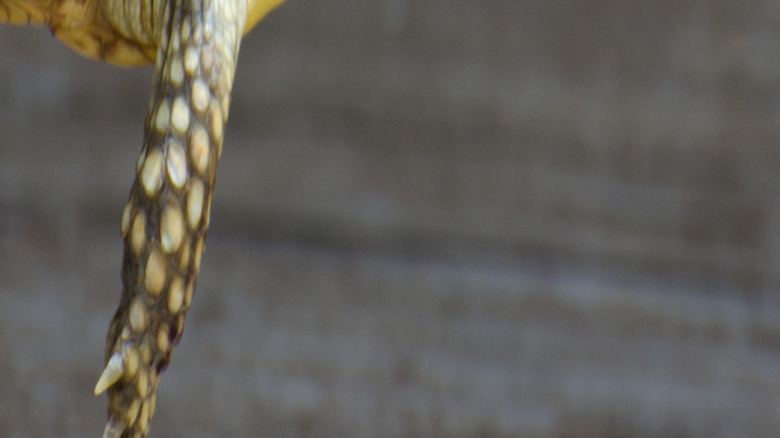Foods In Your Pantry That An Aquatic Turtle Can Eat
We may receive a commission on purchases made from links.
You've just finished setting up your aquatic turtle's tank and brought your new friend home. Now, you may be wondering if there are certain snacks and treats you can offer them in addition to their regular pelleted food. After all, it's a good idea to feed your aquatic turtle a wide variety of items to keep them interested in eating. (If your turtle isn't aquatic, you can also check out our guide on what land-dwelling turtles enjoy eating.)
Aquatic turtles are omnivores, meaning they eat a mix of plant-based and protein-based foods, though the amount of plant-based foods they consume increases as they age. More specifically, adult aquatic turtles should eat about 25% pellets, 25% proteins, and 50% veggies and can be fed every two to three days. This is in contrast to younger turtles, who need to take in more protein and need to eat every single day for the first two or so years of their lives. It's also a good idea to provide turtles of all ages extra nutritional supplements, such as Fluker's Calcium Reptile Supplement, to give them a balanced diet and help them stay strong.
Luckily for turtle parents, these shelled beauties can eat a variety of human foods from the pantry, but some offer better nutrition than others — and it's critical to avoid feeding your turtle any toxic foods that could harm it. That's why we're here to help.
Proteins to give your turtle
A healthy diet is part of caring for your freshwater turtle, and when it comes to pantry foods for your little buddy, you'll want to stick to proteins and fruits and veggies. Crackers, for instance, are high in salt, sugar, and preservatives, making them not so great for turtles. However, a range of protein sources can keep your aquatic turtle interested in their meals, ensuring they get the right nutrients they need. Turtles tend to prefer live protein sources, such as feeder fish from the pet store. However, canned crickets and mealworms make a good treat that can be safely stored in your pantry.
If your turtle prefers fishy foods, dried or canned sardines and smelt are good options. Simply rinse off any canned fish you serve your turtle, and make sure they're brined in water instead of oil to avoid causing any digestive upset. Oily fish or fish packed in oil can also cause vitamin deficiencies in your turtle due to their extra fat content. Aquatic turtles can also eat canned or kibble dog and cat food. However, this should be done sparingly — only as a rare treat — as they're not formulated for a turtle's specific needs. Meanwhile, highly processed meats such as hot dogs and canned meat should be avoided, as they don't offer much nutritional value and can be harmful. Lastly, raw meats should be avoided to prevent any nutritional imbalances.
Fruits and veggies to offer your turtle
There are lots of fresh fruits and veggies available that your turtle will enjoy. Turtles tend to enjoy colorful foods, especially red ones. Red apples and sliced bell peppers make great treats that can be enjoyed by floating them in the water of your turtle's tank. Bananas and oranges are other colorful fresh fruit options that don't need refrigeration. Simply remove any seeds and slice them up into small, bite-sized pieces. Turtles also love a variety of fresh veggies, such as dandelion greens from your yard, mustard greens, and kale. Make sure that any greens gathered from the outdoors are washed and free of pesticides.
There are also some fruits and veggies that shouldn't be given to your pet. For example, avocado, while tasty to humans, is toxic to turtles. Bean sprouts, onions, and tomatoes should also be avoided, as they can be harmful to your turtle. If you're unsure of what pantry foods to feed your turtle, it's always best to contact your veterinarian. They can help make sure that what you're feeding your turtle is keeping them happy and healthy.


